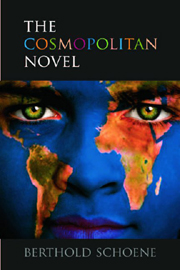Introduction
Published online by Cambridge University Press: 12 September 2012
Summary
Ever since Roland Robertson defined globalisation as ‘the compression of the world and the intensification of a consciousness of the world as a whole’ (1992: 8), sociological research on the increasing tightening of a global web of communal interaction and interdependency has proliferated massively, prompting an equally dramatic growth in cosmopolitan theory. Arguably affecting different spheres of life (economic vs. social/cultural), globalisation and cosmopolitanisation have come to be perceived as twin phenomena working to fix, as Zygmunt Bauman puts it, ‘the intractable fate of the world’ (1998: 1). Only recently have there been any notable efforts to theorise cosmopolitical models of agency and resistance, such as Ulrich Beck's promotion of a ‘methodological cosmopolitanism’. In The Cosmopolitan Vision Beck calls on communities to unlearn their nationalist modes of self-identification and start contributing to global culture instead, always equipped with, as Beck specifies, ‘[their] own language and cultural symbols’ (2006: 21). Conceiving of responsible world citizenship as based on the paradox that ‘there are no others … [there are] many cultural others’ (Tomlinson 1999: 194), contemporary cosmopolitanism promotes a departure from traditional internationalist perspectives while stressing the significance of local cultures for the development of any meaningful and viable world-communal future.
According to Bauman, ‘we are all being “globalized”’ (1998: 1). Reduced to a state of powerlessness and passivity by a plethora of anonymous forces, initiative – both individual and collective – becomes mere wishful fantasy as the world is quite literally taken out of our hands and transported ‘beyond the reach of the design-and-action capacity of anybody in particular’ (60).
- Type
- Chapter
- Information
- The Cosmopolitan Novel , pp. 1 - 34Publisher: Edinburgh University PressPrint publication year: 2009



